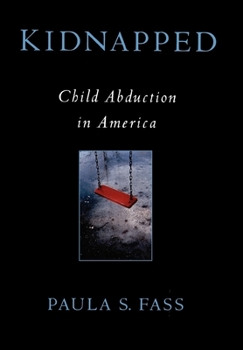Kidnapped: Child Abduction in America
Select Format
Select Condition 
Book Overview
Few crimes capture our imagination as completely as child kidnapping. We are both fascinated and revolted, seeing in each victim our own child, in each bereaved parent ourselves, and in each kidnapper a monster striking straight at the heart of the family and our society. Kidnapping is a modern morality play, the innocence of the child in stark contrast to the corruption the criminal, all played out by a media industry eager to feed the worst fears of every parent. In this pathbreaking book, Paula S. Fass explores how our fear has evolved from its first horrible realization in 1874, when Americans were startled and horrified to discover that their children could be held for ransom, until today, when sexual predators seem to threaten our children at every turn. Kidnapped is a mesmerizing look at some of the great kidnapping cases in American history, the stories that have haunted parents over the past 125 years. Fass describes the kidnapping of Charley Ross in 1874, the first of a series of kidnappings to be called "the crime of the century"; the notorious case of Leopold and Loeb, two rich young men who murdered a younger cousin simply to see if they could get away with it; the abduction of Gloria Vanderbilt, the "poor little rich girl" taken by her own aunt in the middle of a vicious custody battle; and the most famous case of all, the kidnapping of the Lindbergh baby. More importantly, Kidnapped presents, in a series of brilliant narratives, a window into the American mind, providing us with new insights into parenting and the American family, the media and our fascination with celebrity, policing and law enforcement, gender and sexuality, mental health, and much more. She shows, for instance, how the Leopold and Loeb case revolutionized the insanity plea, how the abduction of Gloria Vanderbilt brought the problems of divorce and child custody into the public eye, and how each of the crimes, from Charley Ross to the Lindbergh baby, were defined and shaped by the ever-present media. Turning from these historic cases, she takes us back to crimes that have only recently fallen out of the headlines, such as the disappearance of Etan Patz in New York or Jacob Wetterling in Minnesota, and the growing industry revolving around missing children, from not-for-profit foundations publicizing missing children to for-profit businesses offering to insure children against kidnapping. In this sharp, vivid book, Fass skillfully illuminates our national obsession with child abduction in a society which both values and exploits its youngest members. The loss of each child is a unique and devastating tragedy. But how we respond as a community and as a nation to these crimes speaks volumes about who we are. In confronting how we have treated the children stolen from our lives, Fass shows, we confront ourselves.
Format:Hardcover
Language:English
ISBN:0195117093
ISBN13:9780195117097
Release Date:November 1997
Publisher:Scholars Press
Length:352 Pages
Weight:0.60 lbs.
Dimensions:1.2" x 6.4" x 9.5"
Customer Reviews
2 ratings
Fass presents a very important issue.
Published by Thriftbooks.com User , 18 years ago
This is not easy reading, particularly for a left-behind parent who may have had to or continues to endure the terrorizing tragedy of child abduction or kidnapping (they are two very seperate but painful events, and are dealt with in the courts differently). In 'Kidnapped: Child Abduction in America' by Paula S. Fass, readers are brought into a historical perspective on how society deals with the abduction and wrongful removal of a child, and how this perception has moved the courts in different ways. Fass brings out a very important issue in this meaningful, yet painful book: what is the role of the media in abduction, and how has the role of the public voice directed the subjectivity of the various courts who are charged with overseeing such cases. Importantly, the author also points out that though the law is objective in theory, how the courts have handled abduction is subjective. What is missing, is an in-depth understanding of what a left-behind parent can do for themselves while seaching for a child. Emotionally, physically, spiritually, and financially most left-behind parents are left with scars no words could ever express. The turmoil brought onto a parent, yet alone a child, is unbearable. And for some, always with the safety of the child first and foremost, it may not be easy or suggested that a left-behind parent speaks directly to the press due to concern of their child's safety. Nevertheless, this is an invigorating book, and the stories presented, painful. When you see one of those fund raisers for an organization involved with missing children, do not think twice about helping. If you're a parent involved with a search, keep your faith. Sometimes its the only thing one can hold onto. Again, keep your faith. Well done, and thank you for bringing the issues of child abduction and child kidnapping out further into the public light.
One of the most informative books about child abduction
Published by Thriftbooks.com User , 22 years ago
If you're really interested in missing children and child kidnappings, like I am, this is definately the book for you. It begins with the heartbreaking 1874 ransom abduction of Charley Ross from Pennsylvania. His father refused to pay the ransom, not because he didn't love his son, but because he thought kidnappers should not profit from their crime. Charley never returned home. The next chapter is about the Lindbergh baby, then Leopold and Loeb, and so on. It ends with modern kidnappings: Etan Patz, Kevin Collins and Polly Klaas. There's also a chapter on parental abduction. In other words, this book is very extensive.While it's a very "academic" book, it's not dull like a textbook. I found it very entertaining, with a nice centerfold of photographs. This book should definately have a place on anybody's true crime shelf.






